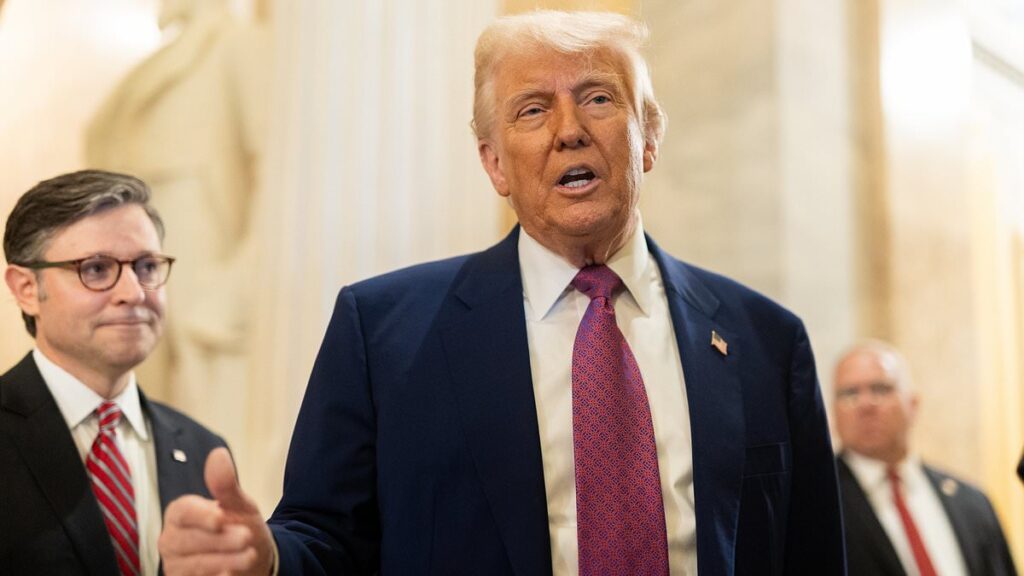House Republicans have successfully passed Donald Trump’s multi-trillion-dollar ‘big beautiful’ tax bill in a major win for the president.
Its passage 215-214 is a major milestone for the White House and Republicans in Congress who have spent the entirety of the new administration crafting the measure’s specifics.
There were two GOP no’s on the vote, Warren Davidson, R-Ohio, and Thomas Massie, R-Ky.
Speaker Mike Jonson, R-La., worked closely with Trump on formulating the bill that features many of the president’s campaign promises, and getting the rest of the GOP rebels across the finish line.
If just three Republicans opposed the bill it would have failed with their razor-thin majority.
Trump threatened that Republicans who didn’t get behind the package would be ‘knocked out’ in the upcoming 2026 midterms elections, considering any dissent ‘the ultimate betrayal.’
This close relationship between the president and speaker gave Johnson leverage over several unruly Republicans who threatened to vote against the bill.
The bill accounts for trillions of dollars in tax cuts and enshrines Trump’s signature slashes in 2017.
House Majority Leader Steve Scalise, R-La., called Trump’s 2017 law ‘revolutionary’ on Thursday, adding that the new bill ‘is even more revolutionary.’
The package also provides for $350 billion to go to MAGA projects including to Trump’s new ‘Golden Dome’ missile defense system and his mass deportation policies.
To fund the massive loss in federal revenue, Congress has decided to make deep cuts to social programs and add work requirements to Medicaid.
Trump threatened that Republicans who didn’t get behind the package would be ‘knocked out’
This close relationship between the president and speaker gave Johnson leverage over several unruly Republicans
On Tuesday, Trump traveled to Capitol Hill to warn Republicans not to ‘f*** around with Medicaid’ benefits, which are popular in many swing districts, and issued his final warning to holdouts.
It is also estimated to add about $3 trillion to the national deficit – which terrified some of the far-right conservative voting block.
The House-passed measure – it is expected to be heavily edited in the Senate – includes cutting taxes on tips and overtime and auto loans as well as extending Trump’s 2017 tax cuts and increasing the Child Tax Credit.
It also makes major reforms to Medicaid and the Supplemental Nutrition Assistance Program (SNAP), including funding cuts and work requirements.
One of the most popular provisions is the ‘MAGA savings account’ giving every newborn baby born a $1,000 investment in their future.
President Donald Trump’s ‘big, beautiful bill,’ which contains tax cuts and reforms to social programs, passed through the House of Representatives after much effort from Speaker Mike Johnson
Johnson has been working on passing Trump’s agenda through Congress all year. Now, the bill will head to the Senate, where it can still be edited
Democrats feverishly pushed back against the bill which contains steep spending cuts for social programs.
However, the liberal members of Congress may as well be bystanders in this process, as the mechanism the GOP leadership is using to get the massive package cobbled together, reconciliation, almost ensures that no Democrat votes are needed.
Though the rules managing reconciliation are strict and only certain bills can employ the tool, it means that the ‘big, beautiful bill’ will need a simple majority in the Senate (51 votes) to send the measure to Trump’s desk for signing.
Typically legislation needs at least 60 votes to pass out of the Senate, however, reconciliation brings that threshold down.
Given that Republicans hold 53 seats in the Senate, the GOP can theoretically pass the bill without Democratic support.
Trump previously used reconciliation in his first term to pass his 2017 tax cuts, which are being codified into law in this current package.
And Joe Biden passed his signature $740 billion Inflation Reduction Act through the same process.
In addition to the tax cuts, the bill includes provisions for a new program that will award parents with a $1,000 investment account for babies born between December 30, 2024 and January 1, 2029.
Dubbed ‘MAGA Accounts,’ parents, friends, family or businesses will be able to invest $5,000 to the portfolios every year.
Speaker Mike Johnson updates the press on reconciliation negotiations on March 14, 2025
The account would be tax-exempt until the child turns 18, after which the funds would be subject to capital gains taxes.
House Republicans also added language to the ‘big, beautiful bill,’ to increase the federal debt limit by trillions.
The inclusion of the increase will help avoid a default on the debt this year, when a previous debt limit agreement is set to expire. Including it in reconciliation also enables Republicans to avoid negotiating with Democrats over the size of the increase.
Intra-GOP turmoil over the debt limit increase, work requirements for Medicaid and SNAP and state and local tax (SALT) provisions threatened to tank the bill before it crossed the finish line.
Conservative members stressed that the work requirements should kick in immediately as the current bill text does not have the work requirements kick into effect until 2029.
‘Delaying work requirements for able-bodied adults on Medicaid to 2029 isn’t ‘progress.’ It’s fiscally irresponsible and another sad excuse for the swamp!!’ Rep. Ralph Norman, R-S.C., a member of the conservative House Freedom Caucus (HFC), posted on X.
Another HFC member, Rep. Chip Roy, R-Texas, similarly wrote on X that its ‘most pathetic’ that work requirements are ‘not implemented til 2029.’
GOP members from high tax states like California and New York took issue during negotiations around the the State and Local Tax (SALT) deduction.
The provision allows taxpayers who itemize on their returns to make certain deductions.
But Trump struck a deal with speaker Johnson to raise the SALT cap to $40,000 for Americans making under $500,000.
That’s a change from deductions capped in Trump’s 2017 tax bill at $10,000.
And it seemed to satisfy the holdouts for the bill in the blue states.
